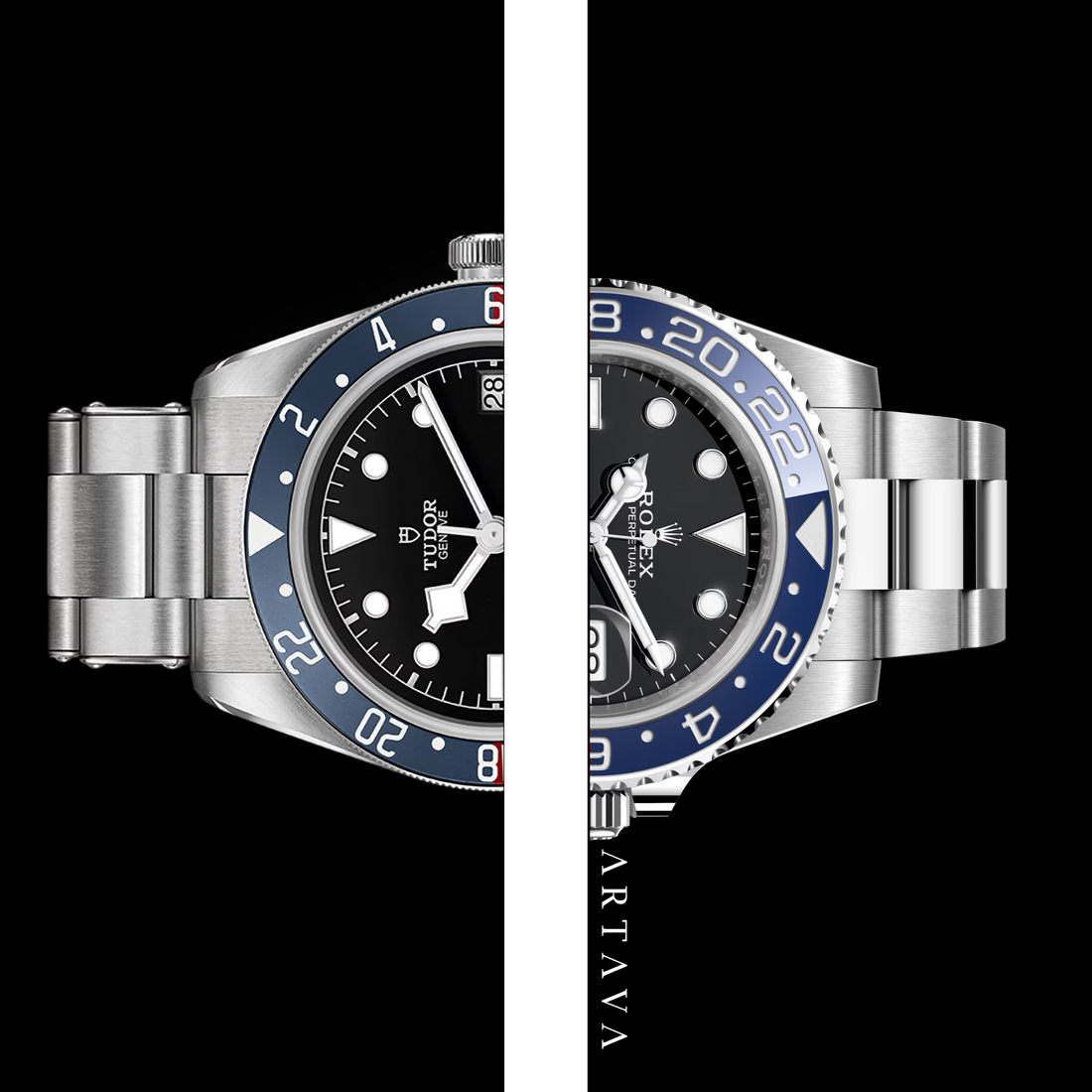
Tudor vs. Rolex: Which Brand Offers Better Value?
Share
When it comes to luxury watches, both Tudor and Rolex stand out as iconic brands with rich histories, exceptional craftsmanship, and devoted followings. However, the question often arises: which brand offers better value? In this detailed comparison, we'll explore the design, history, investment potential, and target audience of both Tudor and Rolex to help you determine which brand might be the better choice for you.
1. History and Heritage
Rolex:
Founded in 1905 by Hans Wilsdorf, Rolex has long been synonymous with luxury, innovation, and prestige. The brand's pioneering achievements, such as creating the first waterproof wristwatch (the Oyster) and the first watch to automatically change the date (the Datejust), have cemented Rolex's reputation as a leader in the watchmaking industry. Rolex's history is filled with iconic models that have been worn by explorers, athletes, and celebrities, making it one of the most recognised and respected names in horology.
Tudor:
Tudor was established in 1926 by Hans Wilsdorf as a more affordable alternative to Rolex, while still maintaining high standards of quality. Tudor watches were initially marketed as offering "a Rolex for less," sharing many design elements and components with their more expensive counterparts. Over time, Tudor has developed its own identity, with a strong focus on robust, tool-oriented watches. The brand gained significant attention with the reintroduction of the Tudor Heritage Black Bay series in 2012, which drew heavily on the brand's vintage designs.
Verdict:
Rolex's history is steeped in innovation and prestige, making it the more historically significant brand. However, Tudor's heritage as a high-quality, value-driven alternative gives it a unique position in the market.
2. Design and Craftsmanship
Rolex:
Rolex watches are renowned for their timeless designs and impeccable craftsmanship. The brand's attention to detail, from the precision of its movements to the quality of its materials, is unparalleled. Rolex models like the Submariner, Daytona, and Datejust are instantly recognisable and have become symbols of luxury and success. Each watch is assembled with meticulous care, ensuring that every component meets the brand's exacting standards.
Tudor:
Tudor's designs often echo those of Rolex but with a more utilitarian approach. The brand is known for its robust and reliable watches, such as the Black Bay, Pelagos, and North Flag. While Tudor watches are not as finely finished as Rolex, they still offer exceptional build quality, often using Rolex-sourced components. Tudor has also made a name for itself with its in-house movements, which offer excellent performance at a more accessible price point.
Verdict:
Rolex wins in terms of sheer craftsmanship and design prestige. However, Tudor offers a compelling alternative, especially for those who appreciate a more rugged and functional aesthetic without compromising on quality.
3. Investment Potential
Rolex:
Rolex watches have a long-standing reputation for retaining, and often appreciating, their value over time. Certain models, particularly vintage and limited editions, can see significant price increases in the secondary market. The brand's strong recognition and demand ensure that Rolex watches are considered safe investments, with many models fetching premium prices at auction.
Tudor:
While Tudor watches generally do not appreciate in value as much as Rolex, they have seen a resurgence in popularity, particularly with models like the Black Bay series. Tudor watches tend to hold their value reasonably well, especially compared to other brands in their price range. However, they are not typically seen as investment pieces in the same way Rolex watches are.
Verdict:
If investment potential is your primary concern, Rolex is the clear winner. However, Tudor offers good value retention for its price point, making it a solid choice for those who prioritise quality and design over investment.
4. Target Audience
Rolex:
Rolex targets individuals who seek a symbol of luxury, success, and status. Its watches are often seen as milestones for achievements and are worn by professionals, celebrities, and enthusiasts alike. The brand's broad appeal and strong brand image make it a top choice for those looking to make a statement.
Tudor:
Tudor appeals to a more niche audience, often attracting watch enthusiasts who appreciate the brand's heritage, quality, and value proposition. Tudor watches are ideal for those who want a high-quality timepiece with a strong brand pedigree but without the premium price tag of a Rolex. The brand also attracts a younger audience, as well as those who prefer a more understated, functional design.
Verdict:
Rolex is the go-to brand for those seeking a luxury statement piece, while Tudor is perfect for watch enthusiasts who value quality and heritage at a more accessible price point.
Conclusion: Which Brand Offers Better Value?
Ultimately, the answer to whether Tudor or Rolex offers better value depends on what you're looking for in a watch.
- Rolex offers unparalleled prestige, timeless designs, and strong investment potential, making it the better choice for those who prioritise luxury, status, and long-term value.
- Tudor, on the other hand, delivers exceptional quality, a rich heritage, and a more accessible price point, making it an excellent choice for those who appreciate fine craftsmanship and value without the need for a luxury badge.
Both brands have their strengths, and your choice will depend on your personal preferences, budget, and what you value most in a timepiece.
Disclaimer
The information provided in this article is for informational purposes only and does not constitute financial advice. It is based on gathered data and market observations. Potential investors should conduct their own research and consider their individual circumstances before making investment decisions.




